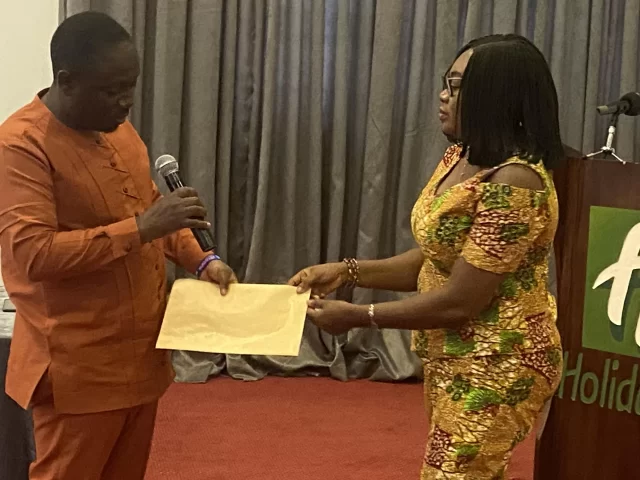By Franklin ASARE-DONKOH
The Coalition of Non-Governmental Organisations (NGOs) in Water and Sanitation (CONIWAS) has called on the government to develop a Ghanaian version of Compact for WASH to be known as the “Ghana Presidential Compact for WASH”.
CONIWAS says its members are available to support the processes towards developing a Ghana Compact, establishing the Sanitation Authority, and a Water Act to streamline activities in the water sector.
The call and the subsequent assurance were contained in a two-page document presented to the president through the Ministry of Sanitation and Water Resources.
The coalition says it has identified some eight gray areas which require the government’s urgent attention to fulfill Ghanaians’ aspirations for safe water, sanitation, and hygiene.
The following are the eight areas:
1. Develop the “Ghana Presidential Compact for WASH”. CONIWAS recognises and appreciates the government’s placing WASH at the top of its development agenda. We particularly appreciate the institutional realignment for WASH, various pro-poor WASH projects, and a demonstration of the government’s will to make change happen. The Erstwhile Ghana Compact for WASH, that was anchored at the Ministerial level presented a perfect summary of the Government’s leadership and prioritization for WASH through deliberate, focused, committed programs with clearly defined plans for funding. Enacting a follow-up WASH Compact to be anchored at the presidential level will further bolster the government’s leadership and commitment to universal access to WASH for all Ghanaians.
2. National Sanitation Authority Now! Government should approve, without any further delay, the establishment of the National Sanitation Authority and a National Sanitation Fund.
3. Sector Reforms: We call for comprehensive sector reforms that address institutional, regulatory, human resource, governance, funding, and technological aspects of WASH. A Water Services Act should be the basis for a harmonized sector. This should address the Regulation of service providers and sanitize the rural water sector interface with the urban water sector.
4. Government should localise Human Rights to WASH that have already been ratified at the UN level by letting the same reflect in our constitution and national laws. As a matter of urgency, Government should invest in new technologies to reach the last mile (populations in hard-to-reach areas). There is a need to explore new technologies for delivering clean water to last-mile communities where all options to deliver water using current standard technologies fail. Additionally, efforts should be made to reach special communities (eg. Slums, displaced populations, etc.) with appropriate sanitation facilities.
5. Move national focus from “Basic” to “Safely Managed” services. The national agenda should focus on “Safely managed” as opposed to “Basic” services, whilst dealing with equity and inclusion to address inequalities guiding the water supply. In practical terms, this requires the government to begin a program to bring water closer to the premises, building on existing boreholes; putting safely managed statistics at the front burner in the national discourse, and addressing the entire sanitation value chain, beyond the provision of improved household toilets.
6. Make a deliberate effort to universalize institutional WASH (Health facilities and Schools): We request that all investments for WASH in communities to include the mandatory provision of WASH to schools, health facilities, and public places where there is a need. District Assemblies should take responsibility for working out a sustainable mechanism for paying water bills for schools, in consultation with teachers, parents, and the Ghana Education Service. Towards this goal, a comprehensive assessment of gaps in WASH in schools and in the health system should be conducted as a matter of agency, to complement data available for schools and Health facilities through EMIS and DHIMS respectively.
7. Climate Change: The Ministry needs to engage more with climate change experts (through EPA) to mainstream all sector policies, strategies, and programs with the WASH aspects of the Nationally Determined Contributions – 2nd edition.
8. All government policies, programs, and activities should be intentional about Gender equity and equality.
Addressing the media after the presentation to the ministry, the Executive Secretary –CONIWAS, Mrs. Basilia Nanbigne, explained that the Government officials will be attending the 2023 UN water conference scheduled to be held on 22 -24 March 2023 in New York.
According to her, the presentation of the eight pointers to the ministry in charge of sanitation and water is the coalition’s contribution to aid the minister and her assignees to present a strong case during the conference.
She noted that the conference will mark the Midterm comprehensive review of the implementation of the UN Decade for Action on Water and Sanitation (2018-2028), thus CONIWAS eight pointers call to state actors to take urgent action to achieve universal access to WASH in Ghana.
The conference, Mrs. Nanbigne said presents a unique opportunity for civil society nationally and globally to re-tool and position priority advocacy issues for the attention of national governments and the international development community.
“CONIWAS is linking with all civil society groups in Ghana that will be present at the meeting, as well as other continental and international advocacy groups to appeal to our government to double steps towards universal coverage of WASH in Ghana.
The coalition is committed to engaging the government and will follow up on the issues raised,” she reiterated.
Our members are also available to support government reach last-mile communities with WASH services so that we “leave no one behind” the Executive Secretary of CONIWAS added.









![Business tycoon in Novrongo to bury late father in a car [Video]](https://ghananewss.com/storage/2023/05/business-tycoon-100x75.jpeg)








